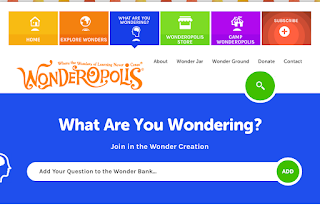Mondays are a great day to get new ideas from the news.
A great place to look is Tween Tribune. Students do not sign up; teachers do. You do not need to sign up to read the articles. This site, sponsored by the Smithsonian, aggregates news for kids-- and creates them with questions and at different reading levels.
See the menu at top for grade levels, and in the right sidebar see topics and Lexile Reading Levels.
Notice there is a search bar, although it is better just to choose a topic of interest to you.
How is Tween Tribune helpful if your teacher does not have an account?
Choose a topic and discover for yourself the interesting news events of today. Read an article, and ask yourself questions:
- What are the facts in the article?
- What is the main message the article wants me to understand?
- Why am I interested in this topic?
- What in this topic connects to me and my world?
- What did I know before?
- What do I know now?
Freewrite about the ideas -- do not summarize, copy, or paraphrase the article: just write about the topic. Put a link to the article in your freewrite so you can return to cite your source and verify facts if you need to.
Another wonderful place to gather ideas is Wonderopolis
Ask yourself the same questions about the article as listed before and freewrite, including the link to the article read.
Writers know stuff; they write about what they know and see. And this is one way to add to your knowledge for three reasons:
- You'll know how to find information
- You'll know when what others say are fact or fiction
- Your writing will be believable.
But do ask yourself:
How does this connect to my writing this week?
- Would it fit with a report or article I want to write - -or an assignment?
- Would the facts, revised into my story, enhance the events and characters in my story?
- Do I need to revise my story to be more real?
- Could I write a story of fiction in which the characters and the plot illustrate these facts?
- Could I create a project that adds value to the information from my interpretation [Animoto, slides, podcast, poem, story, Did You Know, etc.]?
~~~~~~~~~~~~~~~~~~~~~~~~
What if you want to search "Google" for a topic? Learn how to search first:
Then -- be Web Smart. Many of the millions of pages on the Internet are false, fake, and filled with misinformation. YOU must know HOW to validate and verify the accuracy of the website. How? From Google Educators Daniel Russell, Tasha Bergson-Michelson, and Trent Maverick are these tips:

And


And

Follow the lesson on their slides to practice identifying factual or fake [or misinformation that looks like facts].
After trying the lessons, check out the lessons and try the activities [see bold green ] here.
If you think you're ready for a challenge, try the project challenges in bold magenta here.
Your turn:
Share your topic writing [freewrite, stories, poems, etc] that shows your researched ideas at work.
Put a link to your post with your challenge solutions in the comments below.
Teach others: Create your own "search and validate" slide or document or blog post and include the link in a comment below.
After trying the lessons, check out the lessons and try the activities [see bold green ] here.
If you think you're ready for a challenge, try the project challenges in bold magenta here.
Your turn:
Share your topic writing [freewrite, stories, poems, etc] that shows your researched ideas at work.
Put a link to your post with your challenge solutions in the comments below.
Teach others: Create your own "search and validate" slide or document or blog post and include the link in a comment below.
~~~~~~~~~~~~~~~~~~~~~~~
Thanks for learning together.







No comments:
Post a Comment
Please add your comment with respect of others' ideas. Thank you.